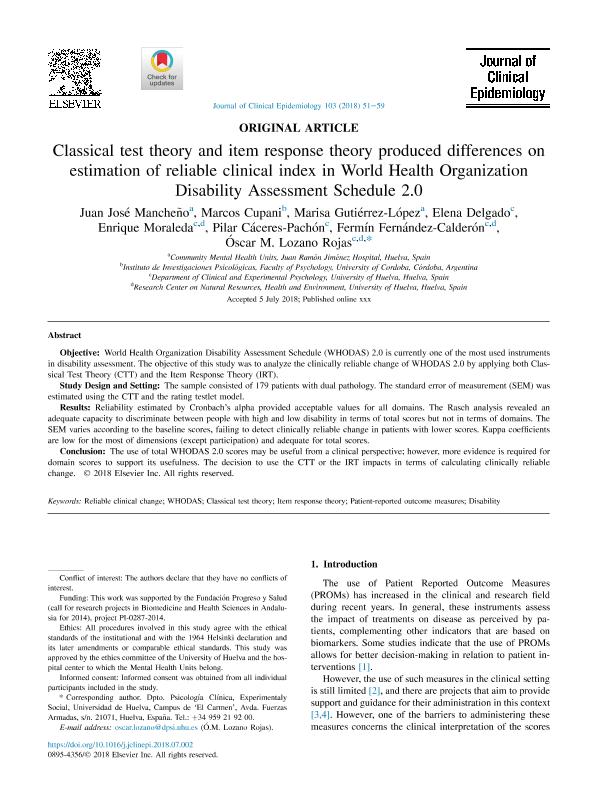Mostrar el registro sencillo del ítem
dc.contributor.author
Mancheño, Juan José
dc.contributor.author
Cupani, Marcos

dc.contributor.author
Gutiérrez-López, Marisa
dc.contributor.author
Delgado, Elena
dc.contributor.author
Moraleda, Enrique
dc.contributor.author
Cáceres-Pachón, Pilar
dc.contributor.author
Fernández Calderón, Fermín

dc.contributor.author
Lozano Rojas, Óscar M.
dc.date.available
2021-02-25T11:57:35Z
dc.date.issued
2018-11
dc.identifier.citation
Mancheño, Juan José; Cupani, Marcos; Gutiérrez-López, Marisa; Delgado, Elena; Moraleda, Enrique; et al.; Classical test theory and item response theory produced differences on estimation of reliable clinical index in World Health Organization Disability Assessment Schedule 2.0; Pergamon-Elsevier Science Ltd; Journal of Clinical Epidemiology; 103; 11-2018; 51-59
dc.identifier.issn
0895-4356
dc.identifier.uri
http://hdl.handle.net/11336/126522
dc.description.abstract
World Health Organization Disability Assessment Schedule (WHODAS) 2.0 is currently one of the most used instruments in disability assessment. The objective of this study was to analyze the clinically reliable change of WHODAS 2.0 by applying both Classical Test Theory (CTT) and the Item Response Theory (IRT).Study Design and SettingThe sample consisted of 179 patients with dual pathology. The standard error of measurement (SEM) was estimated using the CTT and the rating testlet model.ResultsReliability estimated by Cronbach´s alpha provided acceptable values for all domains. The Rasch analysis revealed an adequate capacity to discriminate between people with high and low disability in terms of total scores but not in terms of domains. The SEM varies according to the baseline scores, failing to detect clinically reliable change in patients with lower scores. Kappa coefficients are low for the most of dimensions (except participation) and adequate for total scores.ConclusionThe use of total WHODAS 2.0 scores may be useful from a clinical perspective; however, more evidence is required for domain scores to support its usefulness. The decision to use the CTT or the IRT impacts in terms of calculating clinically reliable change.
dc.format
application/pdf
dc.language.iso
eng
dc.publisher
Pergamon-Elsevier Science Ltd

dc.rights
info:eu-repo/semantics/openAccess
dc.rights.uri
https://creativecommons.org/licenses/by-nc-sa/2.5/ar/
dc.subject
CLASSICAL TEST THEORY
dc.subject
DISABILITY
dc.subject
ITEM RESPONSE THEORY
dc.subject
PATIENT-REPORTED OUTCOME MEASURES
dc.subject
RELIABLE CLINICAL CHANGE
dc.subject
WHODAS
dc.subject.classification
Otras Psicología

dc.subject.classification
Psicología

dc.subject.classification
CIENCIAS SOCIALES

dc.title
Classical test theory and item response theory produced differences on estimation of reliable clinical index in World Health Organization Disability Assessment Schedule 2.0
dc.type
info:eu-repo/semantics/article
dc.type
info:ar-repo/semantics/artículo
dc.type
info:eu-repo/semantics/publishedVersion
dc.date.updated
2020-10-06T17:49:42Z
dc.journal.volume
103
dc.journal.pagination
51-59
dc.journal.pais
Estados Unidos

dc.description.fil
Fil: Mancheño, Juan José. Universidad de Huelva; España
dc.description.fil
Fil: Cupani, Marcos. Universidad Nacional de Córdoba. Instituto de Investigaciones Psicológicas. - Consejo Nacional de Investigaciones Científicas y Técnicas. Centro Científico Tecnológico Conicet - Córdoba. Instituto de Investigaciones Psicológicas; Argentina
dc.description.fil
Fil: Gutiérrez-López, Marisa. Universidad de Huelva; España
dc.description.fil
Fil: Delgado, Elena. Universidad de Huelva; España
dc.description.fil
Fil: Moraleda, Enrique. Universidad de Huelva; España
dc.description.fil
Fil: Cáceres-Pachón, Pilar. Universidad de Huelva; España
dc.description.fil
Fil: Fernández Calderón, Fermín. Universidad de Huelva; España
dc.description.fil
Fil: Lozano Rojas, Óscar M.. Universidad de Huelva; España
dc.journal.title
Journal of Clinical Epidemiology

dc.relation.alternativeid
info:eu-repo/semantics/altIdentifier/url/https://linkinghub.elsevier.com/retrieve/pii/S0895435617311800
dc.relation.alternativeid
info:eu-repo/semantics/altIdentifier/doi/http://dx.doi.org/10.1016/j.jclinepi.2018.07.002
Archivos asociados
